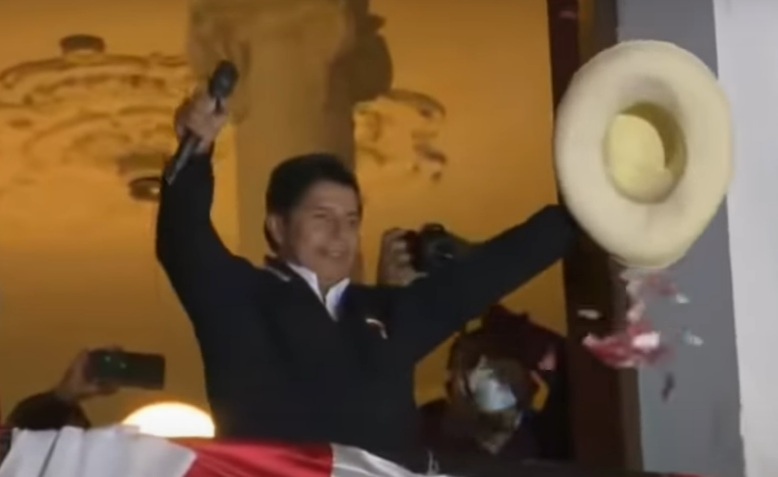 Pedro Castillo. Photo: Screenshot from TeleSur news report
Pedro Castillo. Photo: Screenshot from TeleSur news report
Trade unionist Pedro Castillo’s narrow lead in Peru’s Presidential elections opens up the prospect for radical change, but the right won’t back down quietly, argues Jonathan Maunders
Leftist Pedro Castillo is edging towards victory in Peru’s presidential election, holding a slender lead over Keiko Fujimori with only 0.02% of ballots left to be counted.
While Castillo leads by less than half a percentage point, it is unlikely he will fall behind with so few ballots remaining. However, potential legal challenges including the scrutinising of some 300,000 contested votes may mean days or weeks before an official result is confirmed.
Fujimori, the daughter of the country’s former dictator, Alberto, has followed the Trumpian playbook by alleging numerous counts of electoral fraud and irregularities without much in the way of evidence.
Indeed, an inter-American observer group has stated that they did not find any such irregularities and that the election met international standards.
While Fujimori has dominated voting in Lima and other major cities, Castillo’s path to victory has been driven by his overwhelming support in the poorer, rural areas across the Andes and much of the Amazon.
This division is best exemplified by the voting figures of Peru’s richest and poorest districts. 88% of people in the thriving San Isidro district of Lima voted for Fujimori, while Peru’s poorest district, Uchuraccay, saw Castillo pick up 87% of votes.
A matter of months ago, Castillo was a little-known unionist thought to have no chance of making an electoral impact – he is now set to win the presidency.
How has Castillo done it?
Castillo first came to public attention in 2017 after being a prominent figure in a teachers’ strike over pay and he announced his presidential run in October 2020, following a grassroots campaign.
He built his campaign on his opposition to the expansionary aims of international mining companies in rural Peru, winning mass support in the rural areas affected.
He also promised to rewrite the country’s constitution, following the example of neighbours Chile, to reverse institutional inequality, inspiring many Peruvians beset by poverty.
For many voters, Castillo represents a genuine alternative to the corruption that has increasingly riddled Peru’s politics in recent years. His pledge to only receive a teacher’s salary, if elected, has helped to shape that belief.
What now?
Keiko Fujimori has shown little intention of quietly acknowledging defeat and numerous legal challenges are bound to follow. While she has so far offered very little in terms of evidence for electoral fraud, the small margins mean any rulings could be seismic in determining the overall result.
In a country that has seen countless examples of political corruption in recent decades, many of Castillo’s supporters are concerned that underhand efforts will be made to prevent him from becoming president.
Similarly, some are concerned that Fujimori’s strong ties to powerful figures in the military mean that a coup may be enacted to help her seize power if the legal challenges fail.
Even if Castillo does make it into power, he will have a difficult task enacting his policies. Peru’s congress is dominated by the right and can block, and remove, the president, as they did during predecessor Martin Vizcarra’s efforts to root out corruption.
It is essential the Peruvian left mobilises to ensure that democracy is upheld, Castillo is allowed to attain the presidency and able to enact the popular economic policies he has been elected on.
President Castillo
While he constitutes a unique opportunity for Peruvians to reverse the tide of neoliberalism, Castillo does have serious flaws that will need to be countered by left activists.
He represents an exciting socialist economic platform that offers to take millions of Peruvians out of poverty, ending an increasing cycle of inequality, but he also took some steps during the campaign to “moderate” the policies of the Perú Libre party and is advised by a former economist of the World Bank. So there should be some caution and the left should be prepared to mobilise both in his defence and to push for more radical change.
He also holds some conservative social views that must be opposed. Castillo has opposed expanding the rights of LGBT people in Peru, dismissing same-sex marriage and gender equality-based education. He has also angered the trans community and refused to support abortion.
If Castillo’s presidency is to be truly transformative, socially as well as economically, left activists must strive to make him change some of his positions.
Peru sits on the eve of dramatic change, but the left must be ready to fight to ensure it is delivered.
Join Revolution! May Day weekender in London
The world is changing fast. From tariffs and trade wars to the continuing genocide in Gaza to Starmer’s austerity 2.0.
Revolution! on Saturday 3 – Sunday 4 May brings together leading activists and authors to discuss the key questions of the moment and chart a strategy for the left.

